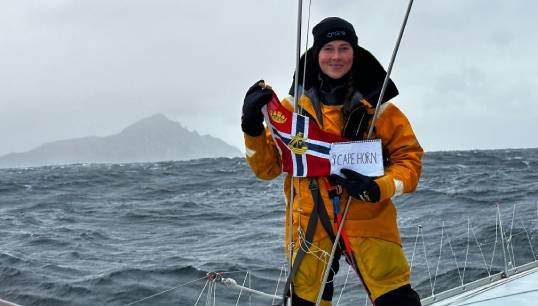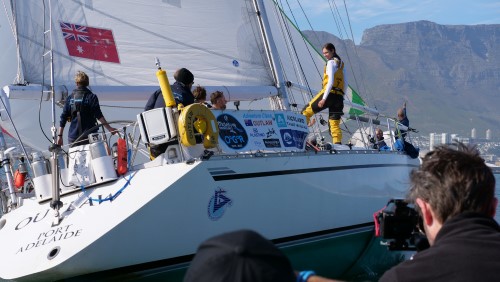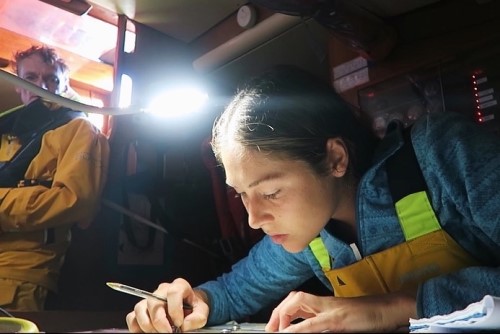- Topics
- Campaigning
- Careers
- Colleges
- Community
- Education and training
- Environment
- Equality
- Federation
- General secretary message
- Government
- Health and safety
- History
- Industrial
- International
- Law
- Members at work
- Nautilus news
- Nautilus partnerships
- Netherlands
- Open days
- Opinion
- Organising
- Podcasts from Nautilus
- Sponsored content
- Switzerland
- Technology
- Ukraine
- United Kingdom
- Welfare

For the latest episode of our podcast, Helen Kelly speaks with India Syms, a young maritime professional whose unconventional journey to becoming a seafarer is inspiring a new generation of seafarers
India Syms, also known as India Rose Ocean, is making waves online. At age 23, she's a qualified deck officer with an unlimited ticket, meaning she can drive any ship, any size anywhere in the world. Her journey began unexpectedly, not with a lifelong dream of seafaring but a chance encounter whilst still at school with the Tall Ships Youth Trust during her Gold Duke of Edinburgh Award. This experience ignited a passion for the sea, leading her to a cadetship with the Royal Fleet Auxiliary (RFA) and ultimately a career as a maritime professional.
India's path is unconventional in an industry often seen as traditional. While many aspire to a life at sea from childhood, her story demonstrates that a maritime career can be a fulfilling choice discovered by chance. This message is central to her work as an advocate for careers at sea, encouraging young people to explore the diverse opportunities the industry offers.
The Ocean Globe Race
Through her experience with the Tall Ships Trust and cadetship India developed a deep affinity for and commitment to traditional seafaring practices, such as using celestial navigation and dead reckoning, despite the introduction of more digital technology onboard commercial vessels. Her navigation skills were put to the test during the 2023 Ocean Globe Race, a gruelling 27,500 nautical mile, round-the-world sailing race. This retro race, prohibiting modern technologies like GPS and AIS, demanded a deep understanding of celestial navigation and an acute awareness of the environment.
'I've definitely become hyper aware of my surroundings,' India reflects, highlighting the stark contrast between the digital reliance of modern shipping and the hands-on approach required in the race. Without the convenience of electronic charts and gyrocompasses, she relied on magnetic compasses, meticulously accounting for variations and deviations to maintain her course. Weather information came from weather faxes and HF radio, emphasising the crucial role of these traditional communication tools in ensuring safety at sea.

India's experience in the Southern Ocean, known for its harsh conditions, further illustrates the challenges of navigating without modern aids. The unpredictable weather, with stretches of overcast skies and towering swells, made celestial navigation a test of patience and precision. She describes waiting for breaks in the clouds and waves to get a glimpse of the sun, a stark reminder of the reliance on nature's elements in traditional seafaring.
Off the coast of Dakar, they encountered a fisherman alone in a small boat, far from land and without fishing gear, food, or water
Watch on NautilusTV!
Listen to the podcast!
Beyond technical skills, the Ocean Globe Race demanded mental fortitude and teamwork. Living in close quarters with 10 other crew members on a 55-foot yacht for months, with no privacy, pushed everyone to their limits. 'The physicality of it wasn't the most challenging thing,' India says, emphasising the importance of managing interpersonal dynamics under pressure. Their success in maintaining a cohesive team, with all 10 original members completing the race, is a testament to their resilience and camaraderie.
The Dakar rescue
India's experiences in the race went beyond the expected challenges of navigating and teamwork. Off the coast of Dakar, they encountered a fisherman alone in a small boat, far from land and without fishing gear, food, or water. The encounter raised concerns about piracy, particularly as the team had been warned about the threat in the area.
As navigating officer, India had to coordinate the rescue while managing communication with other vessels and the Maritime Rescue Coordination Centre (MRCC) ashore. Several commercial vessels were in the vicinity and kept tabs on the situation, including a tanker which eventually was drafted in to assist.
This rescue, captured in a YouTube video, offers a glimpse into the complexities of decision-making at sea and the inherent risks involved. It also underscores the enduring relevance of international maritime laws and the unwritten code of assisting those in need, regardless of the potential dangers.
A platform for advocacy
india's use of social media to help promote maritime careers, stems from time spent online during the coronavirus pandemic. Like many people, India used the enforced lockdown to take part in a series of challenges that very quickly grew her online following.
It was only when lockdowns were lifted, and 'normal' life resumed that India was able to finish her cadetship and return to working at sea with the Royal Fleet Auxiliary. It seemed only natural to shift her newfound social following to offering a glimpse into a world often hidden from public view. Her content, from packing essentials to running the ship's shop, helps to demystify work as a seafarer.
India's use of social media exemplifies the growing trend of maritime professionals leveraging online platforms to connect with wider audiences. Her videos serve a dual purpose: entertaining viewers and raising awareness about the industry. By sharing her experiences, she provides valuable insights into the realities of life at sea, encouraging young people to consider maritime careers.
A future focused on sustainability
India's future plans reflect her evolving interests and her commitment to using her platform for positive change. She aims to combine her maritime experience with her passion for the environment, exploring opportunities to contribute to the industry's sustainability goals.
A recent visit to the International Maritime Organization (IMO) headquarters in London exposed her to the complexities of decarbonising the shipping industry and the vital role of environmental regulations. This experience has fuelled a desire to leverage her social media presence to raise awareness about environmental issues within the maritime sector. She plans to highlight the work of non-government organisations (NGOs) and charities dedicated to ocean conservation.
India's story is one of courage, adaptability, and a deep respect for the sea. From the traditional challenges of the Ocean Globe Race to her modern approach to advocacy through social media, she embodies a new generation of maritime professionals.
Follow India at:
www.instagram.com/india_syms/
@india_syms
www.tiktok.com/@indiarose.ocean?lang=en
@indiarose.ocean
Tags
